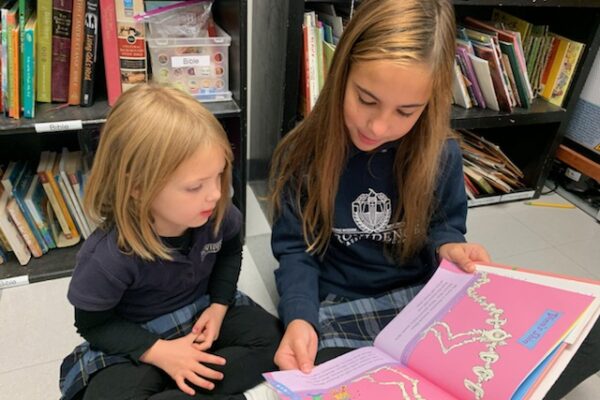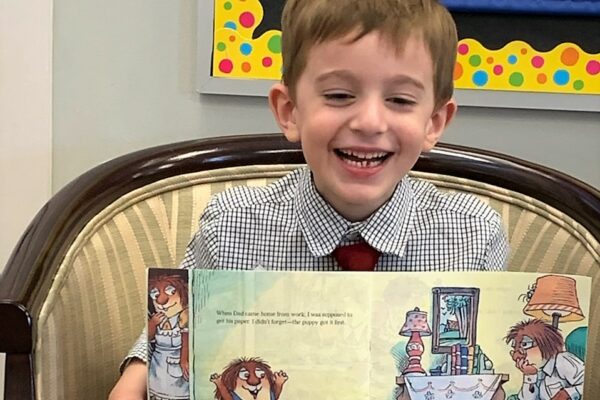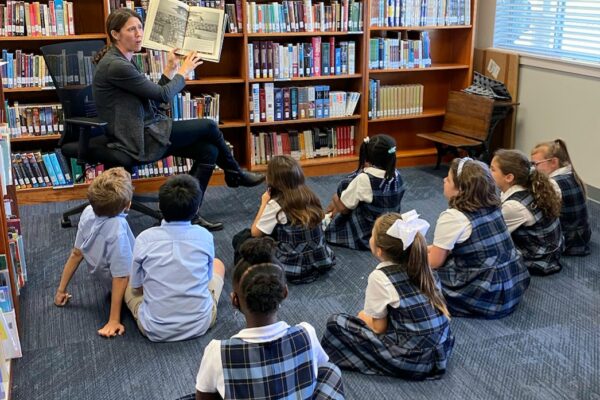10 Ways to Help Kids Choose Books Over Screens
By Dawn Adkins
During summer vacation and school holidays, it seems relatively simple to encourage your kids to read. The long days stretch before your family with great potential, and kids have time to read, play, and participate in family activities in addition to the hours most kids spend on screens and devices.
But now that the school year is in full swing, most of our children’s weekday hours are spent in the classroom, and after-school hours are filled with extracurricular activities, sports, homework, lessons, dinner, and family time.
With so many options vying for your family’s attention, what can you do to help kids choose books over screens during their limited free time?
Want to learn more about how Providence Classical School
partners with parents to disciple the hearts and develop the minds of students?
1. Read in Front of Them
When do most parents find time to read (if they find any time at all)? Adults typically read late at night after the kids are in bed and chores are finished. Makes sense, right? But how can our children understand why we encourage them to read if they never see us prioritizing reading?
In addition, many adults enjoy the convenience of reading on a screen — a phone, tablet, or e-book. So even when we have an opportunity to show our children the value of reading, what do they see? Mom or Dad on a screen.
So what can busy parents do?
Think through times in your typical day and week when you can show your children the value of reading from a physical book, newspaper, or magazine for 15 minutes or longer. Keep a book in your car so that your children see you reading during after-school activities. Spend time with a good book to decompress when you first get home in the afternoons. Wake up as a family on the weekends with a (real, physical) newspaper over breakfast. (Ah, the joy of newsprint fingers!)
The best part is, parents don’t need to feel guilty for taking a reading break every day, even when there is carpool to run and dinner to cook and chores to do. Reading a great book is a joyful priority!

Image by gpointstudio on iStock
2. Read Aloud
Remember all the great books you read as a child? Good news — they’re still great books! There are also countless new-to-you books to explore as a family.
For most children, the joy of reading is “caught vs. taught.” Taking turns reading aloud as a family gives your children an opportunity to “catch” your enthusiasm about stories, characters, settings, and themes that impacted you as a child.
Reading aloud gives younger children access to books they aren’t capable of reading yet. Children can comprehend stories much earlier than they can read them, so reading aloud draws young children into worlds that would otherwise be out of reach.
Also, reading aloud increases children’s vocabularies and improves their reading skills. They learn the cadence of language — pausing or stopping at punctuation, emphasizing words for clarity, and even how to give characters voices! When children listen to you read and practice reading aloud themselves, they gain confidence and skills that will serve them for the rest of their lives.
Lastly, reading aloud promotes family bonding. Whether relaxing together on the couch, in your bed at the end of a long day, or at the table during dinner, reading aloud gives you family quality time together. These precious moments are priceless and impactful.
3. Make Books Part of Your Routine
Like all habits we want to train up in our children, the habit of reading is built upon routine.
In his book The Power of Habit: Why We Do What We Do in Life and Business, Charles Duhigg teaches what he calls “the habit loop.” The habit loop is composed of three steps — Cue, Routine, and Reward — that build habits in our brain. The cue is a trigger that tells our brain to go into automatic mode and follow a routine. The routine can be physical, mental, or emotional. Finally, the reward helps our brain determine whether or not that routine is worth following again.
In the case of reading, the cue might be bedtime. The routine might be reading aloud one chapter as a family every evening before bedtime. And the reward might be the joy of an engaging story and family cuddles! Do this consistently, and in just a few weeks, this routine becomes a habit.
What other reading routines could you build into your family life? Perhaps, every Thursday after piano lessons (cue), you could stop by the library (routine), then grab half-price drinks at Sonic (reward).
Or how about every Sunday afternoon after church (cue), you set aside an hour to rest and read quietly (routine)? Will the reward of feeling rested, relaxed, and enthralled with a good book motivate your children to read more?
Work together as a family to find times when a cue can trigger a reading routine, and be sure to think through a natural reward that will make the habit stick!

Image by Wavebreakmedia on iStock
4. Give Children Plenty of Choices for What to Read
Research shows that kids read more when they get to choose what they read. This doesn’t mean that you need to let your kids consume content you deem inappropriate, but it does mean that your child doesn’t always need to read Caldecott winners. There’s a huge variety of great books for your child to explore!
Let your child select books that interest them — fiction, nonfiction, how-to books, and more. And if you have any concerns about a book’s contents and don’t have time to preview the book, reach out to your local librarian, check online reader reviews, or visit sites like Redeemed Reader or Common Sense Media to get other adults’ perspectives.
Also, make sure your children have ready access to reading material throughout their days — books by their beds, books in the car, books to read while waiting for appointments — and, of course, make frequent visits to the library!
Books make great Christmas and birthday gifts, but remember that you don’t have to break the bank to fill your home with books! Visit the used book store, check out (or build your own) local Little Free Library, and trade books with other families. Some churches even have libraries with family-friendly options for kids and teens. There are so many ways to create a rich reading environment for your children!
5. Practice Re-Reading
Young readers gain confidence and security from re-reading books they’ve read before. Family favorites, book series, and well-worn children’s classics become old friends and create wonderful memories associated with reading.
Encourage children to re-read books they’ve enjoyed in the past. Ask family members to select books they’ve read on their own that they would like to read aloud to the family. Create a shelf of “fan favorites” that your family would recommend to each other — they’re likely to come back to these time and time again.
Set reading traditions! You might read The Chronicles of Narnia every summer as a family or celebrate holidays with a related read-aloud. There are many ways to encourage your children to re-read books!
6. Don’t Focus on “Reading Levels”
Unless they have a specific reading concern, most children should not be limited to reading “on level” and should be encouraged to enjoy a wide variety of books!
Preschoolers can spend hours just looking at pictures in a book and making up their own stories to match (great training for early reading comprehension!). Early readers might search the text for words they know and sound out simpler words while a parent reads the rest of the text. Emerging readers may benefit from alternating “easy” books with more challenging ones. And advanced readers may choose to read storybooks simply for the joy they bring.
Allowing your child to read a variety of book “levels” builds different reading skills — decoding, fluency, vocabulary, comprehension, sentence construction, reasoning, and more. Kids can read to learn empathy, culture, history, and science, or perhaps just to enjoy the sounds of words.
Because reading fulfills a myriad of purposes, no one “level” of books is “right”!

Image by GeorgeRudy on iStock
7. Encourage All Kinds of Reading
Reading isn’t just for storybooks! Cookbooks, magazines, comic books, newspapers, almanacs, encyclopedias, and special interest books like the Guinness Book of World Records all have value in your reading repertoire.
And don’t forget about audiobooks! Road trips, commutes, and even cooking meals can be more fun with a great audiobook for the whole family. Audiobooks offer many of the same benefits as reading aloud, including increasing vocabulary and attention spans.
Another option for the busy family-on-the-go is listening to podcasts of stories as well as interviews with readers, authors, and illustrators. Check out sites like Book Club for Kids, Storynory, and All the Wonders for great material to fill your child’s world with books!
8. Make Reading Eventful
Make reading part of special events!
Have a “reading meal” when every family member brings a book to the table and reads during dinner — then discuss what everyone read during dessert. Or create a fun tradition like “Taco Tuesday with Tolkien” and work your way through an epic fantasy adventure in weekly installments!
Take the party outside! Set up a tent and hammock in the backyard on a lovely evening, add some twinkle lights, and read with flashlights under the stars. Or have a picnic at the park with books and blankets and breaks to play.
There are so many ways to make reading a much-anticipated event.

Image by Halfpoint on iStock
9. Surround Your Family with Other Readers
Reading isn’t just a solo activity, and peer pressure works. Children are motivated to read in a community of readers!
Join a local book club, participate in a summer reading challenge, host a book party, or meet friends at the library for storytime. Set up video calls for your children to read with their grandparents. Seek out opportunities to attend book readings and signings by children’s authors.
Just as parents help guide their child’s friends, choices, and worldview through the daily environment they choose for their child, so also parents can influence their child’s views on reading through the school, organizations, people, and activities they build into their family life.
10. And, Of Course, Limit Screen Time
This goes without saying, but the best way to help kids choose books over screens is to limit their screen time to a reasonable amount.
Suppose you offer your children watermelon for dessert. They love watermelon and would gladly eat it until they’re full.
But what if you set cake at one end of the table and watermelon at the other and tell your children they need to eat what’s in front of them. The children would likely always want the cake, and those who are only offered watermelon would likely complain.
The same goes for screen time and books. As parents, we know that reading can be both enjoyable and good for our kids. However, if offered the choice to watch screens or read books, the vast majority of kids will choose screentime.
Limiting screentime just to weekends or to an hour after dinner opens up hours of unstructured time when kids can get lost in a great book instead!
Students at Providence Classical School love to read!
Reading at Providence Classical School
At Providence Classical School, reading is celebrated frequently with special events like book parties, parades, and reading vacations (a whole or half-day to camp out in the classroom with blanket forts, pillows, flashlights and piles of books!). Older students pair with younger students as reading buddies. Children are motivated to read more and to explore a wider variety of books through reading challenges.
Reading is built into every area of student life at PCS. Children have access to excellent books in both the library and their classrooms, and our Paladins read indoors and outdoors, silently and aloud, alone and in groups.
In addition, our greater school community supports reading at PCS. Parent volunteers read to classes, serve in the library, and organize book parties. Providence families even read “together” each summer through a featured book selection.
Your children’s school and teachers have a tremendous impact on whether or not they will love reading. It’s important to choose a school that emphasizes reading in all subject areas and makes reading fun and engaging.
If you desire to find an environment for your child that promotes the joy and fulfillment found in confident reading, then Providence Classical School may be the best fit for your family. Want to learn more? Watch this video and schedule a tour today!
Read more posts on Parenting on the PCS blog!
Header image by doble-d on iStock














